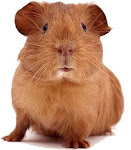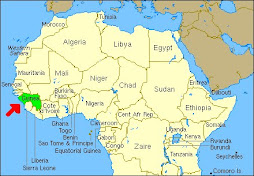Hey amigos!
Here’s some random updates from Dabola—odd and entertaining things I’ve seen while wandering around town.
First, we all know that the baby on the back tradition is alive and well in Africa. It is the way to carry your child— from the age of an infant to about a two-year-old. Little kids often imitate their mothers doing this, tying little dolls or other random things onto their backs. But one kid, who looked about three, took the cake. The doll he had tied onto his back was SO big that from a distance I had know idea what it is—all I saw was a jumble of different-colored limbs. It was a white plastic doll that must have stood about 3 feet high, when not strapped onto an even smaller kid’s back. Its big white plastic arms were sticking up above the kid’s head at different angles and its plastic dolly legs were jutting out in front. Needless to say, it looked ridiculous and adorable at the same time, and I couldn’t help laughing out loud as I walked past the oblivious little boy (and kept laughing for about the next 100 meters too!)
Additionally on the subject of piggy-backing, I saw some young girls accomplish an impressive feat that in my childhood, I always wanted to attempt but never quite had the prowess to pull off—the double piggy back. They were standing only about twenty feet from where my colleagues and I were sitting at the village bank one day. Our heroine was about twelve years old and she already had a girl who looked about eight on her back. Then she managed to bend over, and a ten-year-old climbed on on top of that! The ten-year-old had long enough arms to be able to reach around the eight-year-old and they all proudly (and noisily) took off to show some grown women. I was massively impressed! I’ve never seen anyone else manage that! (Any volunteers want to try when I get back?) I made sure all my colleagues saw, but no one seemed quite as thrilled as I was. :) Oh well, there are perks to being easily entertained.
One thing that seems somewhat universal is high school girls being high school girls. I went to a soccer match—apparently a big deal of a soccer match—that featured the 11th grade vs. the 10th grade teams from the local high school. It was the final of some tournament and I and everyone in Dabola under the age of twenty were present. The field was pure dust, and everyone crowded the sidelines sucking on oranges and cheering. I found myself surrounded by high school and middle school-aged girls. They seemed to be all dressed in their best pagne—matching tops and wrap skirts, hair freshly braided, proud and ready to show off. I’d say about zero of them were actually paying any attention to the game, yet somehow, they all seemed to know at exactly which moments to scream and jump up and down, when their team would shoot a near-miss or perform an awesome save. It seems to be a high-school-girl sixth sense. It felt like Friday night football in America.
Two other cool things I got to do recently: hold babies and look at electric dams! (Random, I know!) But first I should explain that an ongoing form of entertainment for me is finding the smallest babies I can, silent sleeping bumps fastened to their mother’s backs. The mothers go about their daily business in the market and at home, seemingly not even remembering the baby back there, but I’m just fascinated—the tinier the little human, the more I have to try not to stare. And sometimes I’m too tempted and just have to pat the little baby butt. (Boy, I sound like my mother there.) Anyway, a colleague and I recently visited his sister, who’d just given birth. The baby wasn’t even a week old. I’d never seen such a tiny baby! (I should also note that typically, African village women eat less when they are pregnant, because a smaller baby is that much easier to birth.) So this one was miniscule! I even got to hold it. They asked me if I wanted to throw it on my back; I declined. Maybe it was because I’d asked at what age they start wearing babies on the back and they told me at about this age—one week. Wow! Floppy heads and everything. “Baby” didn’t even have a name yet—that happens at a baptism ceremony when it’s about eight days old. Until then it’s just “Baby.” Even better is the Pulaar word for baby, “Bobo.” (Drag out the first syllable and make it long.) I love that word and it is definitely coming back to America with me. :)
And lastly, not involving small children, or any children at all! I got to see where my town’s electricity comes from. The local hydroelectric facility was put in place by the Chinese in the 1974 and refurbished in the 90s. In America, you’d never be able to stroll into a major electrical plant. But here, I just did. A lone guy was sitting at a table in the middle of a huge room with high ceilings. He had his feet propped on the table and was gazing at a wall-full of flashing lights and buttons. He stood up and shook my hand when I came in, and then I got to look at all the flashing lights and buttons myself! Everything was labeled in Chinese! Most knobs and buttons and dials also had a French translation printed in small letters, but not all of them. … And now I see why things don’t get fixed when there’s a break down!
Hope everyone’s doing well and life is happy in America!
I'm baaaaaaaack....
13 years ago

